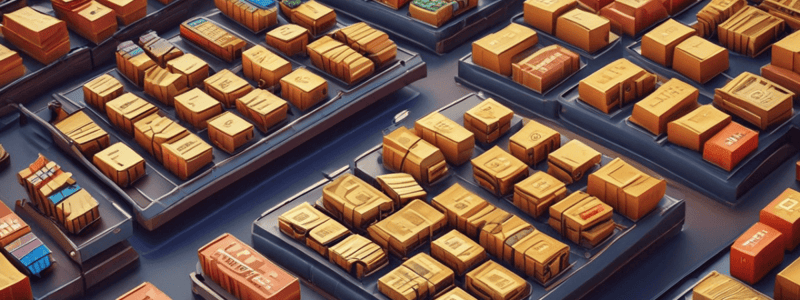Podcast
Questions and Answers
Which economic system is characterized by a minimal role for the government in the economy?
Which economic system is characterized by a minimal role for the government in the economy?
- Mixed economy
- Communism
- Socialism
- Capitalism (correct)
What is the defining feature of a socialist economic system?
What is the defining feature of a socialist economic system?
- Minimal government intervention in the economy
- Wealth distribution based on individual merit
- Collective ownership of resources by the community (correct)
- Private ownership of the means of production
Which economic system is characterized by individuals pursuing their own self-interests?
Which economic system is characterized by individuals pursuing their own self-interests?
- Communism
- Capitalism (correct)
- Socialism
- Mixed economy
What is an example of opportunity cost?
What is an example of opportunity cost?
What are the benefits of capitalism?
What are the benefits of capitalism?
What is the definition of economics?
What is the definition of economics?
Which of the following best defines scarcity?
Which of the following best defines scarcity?
What is the opportunity cost of a decision?
What is the opportunity cost of a decision?
Which of the following is NOT considered a factor of production?
Which of the following is NOT considered a factor of production?
What category do renewable and non-renewable resources fall under?
What category do renewable and non-renewable resources fall under?
What term refers to the human effort involved in the production process?
What term refers to the human effort involved in the production process?
Which of the following is a form of capital?
Which of the following is a form of capital?
Study Notes
Scarcity
- Scarcity refers to the fundamental economic problem of unlimited wants and needs with limited resources.
- It implies that the needs of individuals are infinite, but the resources available to satisfy those needs are finite.
Opportunity Cost
- Opportunity cost is the value of the next best alternative forgone as a result of making a choice.
- It represents the sacrifice made when choosing one option over another.
Factors of Production
- Factors of production are the resources used to produce goods and services.
- The four main factors of production are:
- Land/Natural Resources
- Labor
- Capital
- Entrepreneurship
Land/Natural Resources
- Land/Natural Resources refer to the natural resources found in the earth's crust, such as minerals, water, and land.
- These resources are used to produce goods and services.
Labor
- Labor refers to the physical or mental effort of humans used to produce goods and services.
- It includes the skills, abilities, and experience of individuals.
Capital
- Capital refers to both physical and human capital.
- Physical capital includes buildings, machines, and equipment used to produce goods and services.
- Human capital includes the education, skills, and experience of individuals.
Competition
- Competition refers to the rivalry among firms for market share and customers.
- It is a key feature of a market economy, promoting innovation, efficiency, and lower prices.
Socialism
- Socialism is an economic system where the government owns and controls the means of production.
- Three key facts about socialism:
- The government plays a significant role in the economy.
- Resources are owned and controlled by the state.
- The goal is to promote social welfare and equality.
- Three examples of socialist countries:
- Cuba
- Venezuela
- Sweden
Communism
- Communism is an economic system where resources are owned collectively by the community.
- Three key facts about communism:
- The means of production are owned and controlled by the community.
- Resources are distributed based on need.
- The goal is to create a classless society.
- Three examples of communist countries:
- North Korea
- China
- Vietnam
Capitalism
- Capitalism is an economic system where individuals own and control the means of production.
- Three key facts about capitalism:
- The means of production are owned and controlled by private individuals.
- Resources are allocated based on market forces.
- The goal is to create profit and wealth.
- Three examples of capitalist countries:
- United States
- Canada
- Australia
Opportunity Cost Example
- An example of opportunity cost is choosing to go to college instead of starting a business.
- The opportunity cost of going to college is the potential income that could have been earned by starting a business.
Benefits and Negatives of Capitalism
- Benefits of capitalism:
- Economic freedom
- Innovation
- Efficiency
- Negatives of capitalism:
- Income inequality
- Exploitation
- Market instability
Benefits and Negatives of Socialism
- Benefits of socialism:
- Equal distribution of resources
- Social welfare
- Stability
- Negatives of socialism:
- Lack of incentive
- Bureaucratic inefficiency
- Limited choices
Pros and Cons of Communism
- Pros of communism:
- Central planning
- Social equity
- Public ownership
- Cons of communism:
- Lack of innovation
- Inefficiency
- Lack of incentive
Economics
- Economics is the study of how people make choices to satisfy their wants and needs with limited resources.
- It examines the behavior of individuals, businesses, governments, and societies in allocating resources.
Studying That Suits You
Use AI to generate personalized quizzes and flashcards to suit your learning preferences.
Description
Test your knowledge of economics concepts with this multiple-choice pre-quiz. Questions cover topics like scarcity, opportunity cost, and factors of production.




